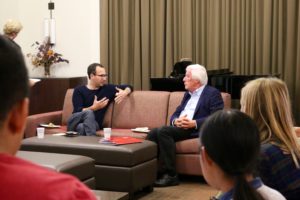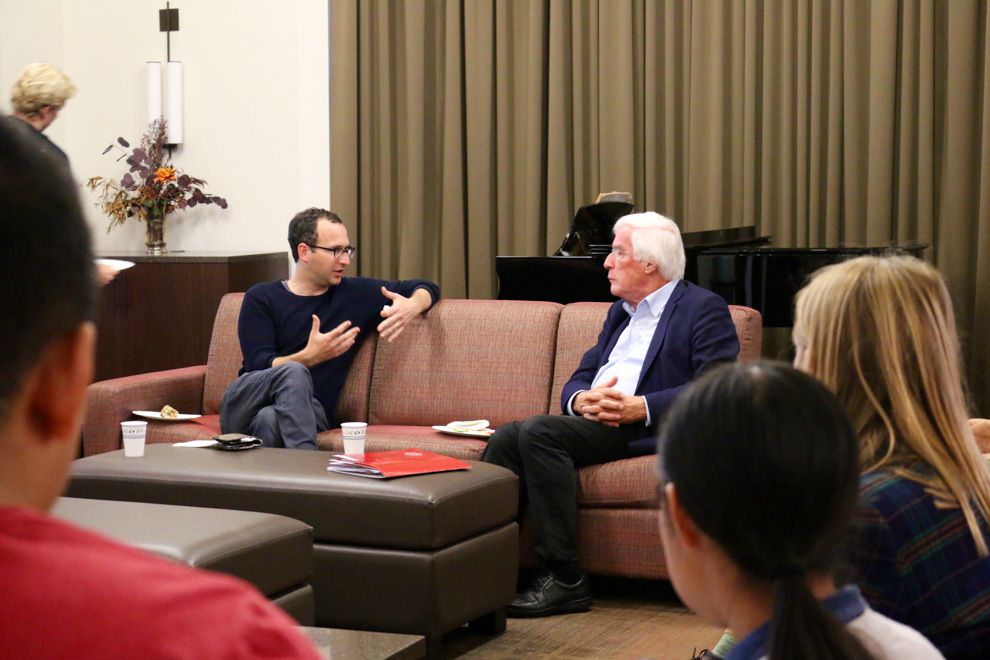Gerhard Casper, University president from 1992-2000, visited the newly renamed Casper Quad for the first time on Tuesday for a discussion about his life experiences with members of Ng House.
Casper was born in Hamburg, Germany before World War II. He said that the educational system there taught him to appreciate intellectualism and the humanities. In Germany, students are required to specialize in one subject before attending university. Casper chose law with the intention of joining the foreign service, later abandoning plans to focus full-time on law.

He first visited the United States at age 15, representing the Federal Republic of Germany in an international competition held by the New York Herald Tribune, which was later bought by The New York Times. For the next three months, Casper traveled between host families across the east coast of the United States. During this time, Casper said he learned about American politics and about living on his own.
“My host father once told me, ‘If you can survive three months in this situation, you can survive in any anthropological situation,'” Casper said.
After three months, Casper returned home to attend the University of Hamburg. Casper said he would study law from the books but took the opportunity to sit in on philosophy, divinity and history classes. This is where he developed a passion for literature and historical studies. He returned to the United States to attend Yale Law School, where his law, science and policy professor offered to help him find his first teaching job, despite the fact that they often would butt heads.
“Only in the U.S. would you have seen a professor that I had fought with offer you a teaching position. In Germany, no,” he said.
Casper returned to Germany to get his doctorate at the University of Freiburg before taking his professor up on the offer, going on to teach at Berkeley for two years, followed by 26 years at the University of Chicago. At the University of Chicago, Casper worked with famous author Hannah Arendt on a class about the Nuremberg Trials.
“Hannah emphasized that the most important aspect of education is faculty-student interaction — that both faculty and students are there for scholarship,” he said.
He said he admired Arendt as a social thinker and agreed with her position on education. Casper was recruited to be president of Stanford in 1992, and he commented that he “revived the motto.”
“The only reason that I was brought to Stanford was because after eight presidents who couldn’t pronounce the motto, they finally found someone who could,” he joked.
Professor Dan Edelstein, resident fellow of the Ng House, laughed at this statement, commenting on how contemporaries reflect on Casper’s time as president of Stanford.
“The thing we hear all the time is, ‘you know, when Casper was president,’ and so on and so forth with all of the amazing things he’s done,” Edelstein said.
During Casper’s time as Stanford’s president, he oversaw the adoption of the minor to reduce the workload of a double major. He also instituted freshman and sophomore introductory seminars (IntroSems). Casper credits Condoleezza Rice, his vice provost of undergraduate education, for working with him to put a greater emphasis on teaching instead of research.
“There is the old saying: People talk about research opportunities and teaching burdens,” he said.
Some of Casper’s fondest memories of serving as president came from fundraising events, where he met a diverse range of inspiring people. Casper said he enjoyed getting to know people’s stories, and he did not miss a single home football game in the process. Despite the politics of serving as the head of a university as prominent as Stanford, Casper said he only took positions on matters related to higher education. He said that, as the face of the University, any political positions he held would be equated with University views, which would be deceiving. He said he gained inspiration reading biographies, particularly one on Harry Truman.
“There was this biography by David McCullough on Truman, the president. Reading it and seeing what he had to deal with gave me the strength to lead the university,” he said.
Casper mentioned his fondness for the works of Thomas and Heinrich Mann. Ng House resident Ryan Frankel ’18 also expressed interest in this literature and commented on Casper’s choice of literature.
“It was so amazing to be in the presence of someone so well-read and intellectual; it’s always nice to encounter someone with such vast experiences and knowledge,” Frankel said.
Casper joked that he feels ambivalent about having Casper Quad named after himself, saying that he is put in the dangerous position of having it renamed.
“Getting the call now means that not long from now, I am going to expect a call that it is being renamed again,” Casper said. “I just hope it gets a good four or five years of use first.”
Contact Gillian Brassil at gbrassil ‘at’ stanford.edu.
